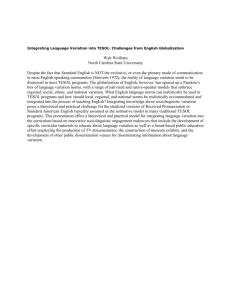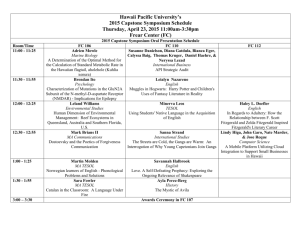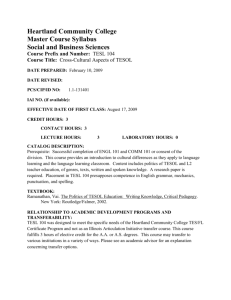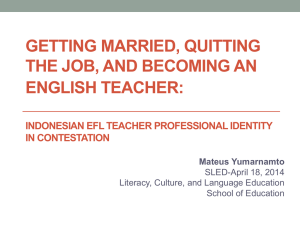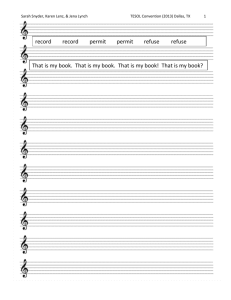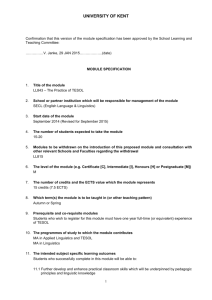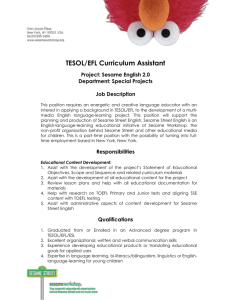Antoaneta Bonev
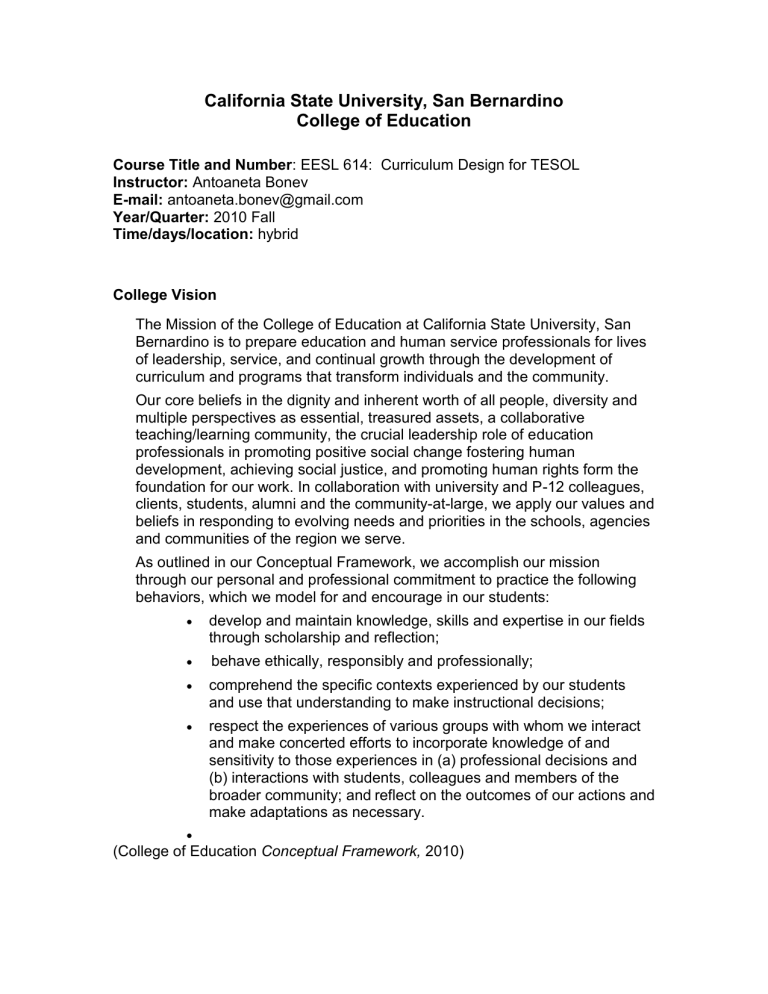
California State University, San Bernardino
College of Education
Course Title and Number : EESL 614: Curriculum Design for TESOL
Instructor: Antoaneta Bonev
E-mail: antoaneta.bonev@gmail.com
Year/Quarter: 2010 Fall
Time/days/location: hybrid
College Vision
The Mission of the College of Education at California State University, San
Bernardino is to prepare education and human service professionals for lives of leadership, service, and continual growth through the development of curriculum and programs that transform individuals and the community.
Our core beliefs in the dignity and inherent worth of all people, diversity and multiple perspectives as essential, treasured assets, a collaborative teaching/learning community, the crucial leadership role of education professionals in promoting positive social change fostering human development, achieving social justice, and promoting human rights form the foundation for our work. In collaboration with university and P-12 colleagues, clients, students, alumni and the community-at-large, we apply our values and beliefs in responding to evolving needs and priorities in the schools, agencies and communities of the region we serve.
As outlined in our Conceptual Framework, we accomplish our mission through our personal and professional commitment to practice the following behaviors, which we model for and encourage in our students:
develop and maintain knowledge, skills and expertise in our fields through scholarship and reflection;
behave ethically, responsibly and professionally;
comprehend the specific contexts experienced by our students and use that understanding to make instructional decisions;
respect the experiences of various groups with whom we interact and make concerted efforts to incorporate knowledge of and sensitivity to those experiences in (a) professional decisions and
(b) interactions with students, colleagues and members of the broader community; and reflect on the outcomes of our actions and make adaptations as necessary.
(College of Education Conceptual Framework, 2010)
The Mission of TESOL, Inc.
TESOL as a profession promotes excellence in education for English learners and a high quality professional environment for their teachers. The mission of
TESOL is to develop the expertise of those involved in teaching English to speakers of other languages to help them foster effective communication in diverse settings while respecting individuals' language rights. To this end, TESOL advances standards for professional preparation and employment, continuing education, and student programs; produces high-quality programs and services, and promotes sound, research-based education policy and practices that increase awareness of the strengths and needs of English learners and furthers appreciation of diverse linguistic and cultural backgrounds.
The Mission of the M. A. in Education, Teaching English to Speakers of
Other Languages Option program at CSUSB
The M. A. in Education, Teaching English to Speakers of Other Languages
Option program has as its overall mission the improvement of the teaching of English to speakers of other languages, with respect for the integrity and maintenance of the diverse languages and cultures of the learners. The vision of the program is to bring a renewed dedication and joy to English language teaching so that the world of the present and future sustains and nourishes the spirit of humanity.
Catalog Description
Offers a perspective on current research principles and investigation across a wide spectrum of topics in Teaching English to Speakers of Other
Languages, including communicative competence, transfer, modalities of language use, learning styles and strategies, and language acquisition.
Course Overview and/or Rationale
This course is designed to explore topics related to the TESOL curriculum design. This will include critique and conceptualization of curriculum policies and frameworks; research, development and implementation of principles of curriculum design to the TESOL programs, materials selection and adaptation, teaching and evaluation in language curriculum design.
This is a required course in the M. A. in Education, Teaching English to
Speakers of Other Languages Option, providing a foundation for the expert practitioner or future researcher. The class will follow a hybrid format, combining theory and practice in both cooperative and individualize learning mode. Ongoing changes to the syllabus are possible in order to fit better the course content to the needs of the class members.
Course Outline by Topic
1. Foundations of curriculum design
2. Curriculum for TESOL as a dynamic system: critical perspectives
3. Teaching within the required curriculum: challenges and innovations
4. Content analysis: component, focus, standards, materials
5. Conceptualizing language goals and objectives: differentiated instruction, challenges
6. Student-centered teaching: social and cultural context
7. Assessment focus in EFL curriculum
8. Design a new language course: holistic view, components
9. Curriculum & Technology
10. Innovations in curriculum development: multicultural perspective
Relevant Professional Standards
Candidates will be working with the following sets of standards:
TESOL ESL Standards for Pre-K-12 Students, Online Edition http://www.tesol.org/s_tesol/seccss.asp?CID=113&DID=1583
TESOL Standards for ESL/EFL Teachers of Adults (2008) http://www.tesol.org/s_tesol/seccss.asp?CID=1974&DID=12056
Korea: The National School Curriculum/ English http://www.apecknowledgebank.org/file.aspx?id=1963
Council of Europe/ Common European Framework of Reference for
Languages: Learning, Teaching, Assessment http://www.coe.int/T/DG4/Linguistic/Source/Framework_EN.pdf
California ESL Model Standards and Key (1992) https://www.casas.org/home/index.cfm?fuseaction=home.viewFile&M apID=1694
California English-Language Development Standards http://www.cde.ca.gov/be/st/ss/documents/englangdevstnd.pdf
Comprehensive Adult Student Assessment Systems (CASAS) https://www.casas.org/home/index.cfm
Secretary's Commission on Achieving Necessary Skills (SCANS) competencies http://wdr.doleta.gov/SCANS/
Course Goals/Objectives
The course will focus on the objectives indicated below:
1. Gain an understanding of the major issues and controversies in the field of foreign language acquisition and pedagogy and their implications for classroom teaching within a required curriculum.
2. Develop a rational basis for the development, deployment, and evaluation of instructional programs in EFL
3. Select and/or develop instructional materials, using technology where appropriate; make informed decisions on the choice of texts and professional resource materials based on a familiarity with a wide variety of offerings from the major EFL publishers
4. Analyze principles of student assessment and testing, including proficiency and achievement testing as well as performance and curricular-based assessment
5. Demonstrate an understanding of the basic concepts concerning the relationship between language and culture, including the importance of a teacher's understanding the culture of the learner; the use of culturally compatible teaching techniques; ways to motivate the learner to achieve a bicultural identity; techniques to teach English using the learner's culture as well as the target culture; fundamentals of crosscultural communication patterns, comparing the learner's culture to the English target culture; and ways to use intercultural communication to teach
English
6. Be able to describe the professional roles of the TESOL educator in the classroom, school, community, and profession; consult with other colleagues and share EFL teaching expertise; act as a colleague in a cooperative role with paraprofessionals, parents and community aides in an EFL classroom; participate in professional development
Participants completing the course should be able to answer the following questions:
1. What does it mean to be a TESOL educator?
2. What are exemplary curricula in EFL?
3. How are curricula in EFL evaluated?
4. What are various kinds of units and lessons? How are these planned?
5.
What are models of programs within which EFL instruction is delivered?
6. What current issues in EFL require leadership response?
Course Requirements
Students are expected to be self-motivated, active participants in the class. This class has been designed as a hybrid class.
Required Text
Graves, K. (2000). Designing language courses: A guide for teachers.
Boston: Heinle & Heinle. (ISBN 083847909-X)
Recommended Chapters (depending on your target-teaching level)
McKay, P. (Ed.) (2006). Planning and teaching creatively within a required curriculum for school-age learners. Alexandria, VA: Teachers of English to
Speakers of Other Languages.
Snow, M. A., & Kamhi-Stein, L. (Eds.). (2006). Developing a new course for adult learners. Alexandria, VA: TESOL.
Burns, A, & de Silva Joyce, H. (Eds.) (2007). Planning and teaching creatively within a required curriculum for adult learners. Alexandria, VA: Teachers of English to Speakers of Other Languages.
Carroll, M. (Ed.) (2007). Developing a new curriculum for adult learners.
Alexandria, VA: Teachers of English to Speakers of Other Languages.
Course Policies
Assignments are due at midnight Sunday night Pacific time. Students are expected to adhere to all University policies related to academic honesty and plagiarism as explained in the University catalog. Late submission will cost a 10% reduction of the point value awarded during assessment. If you are not able to submit you work on time for some session, it is your responsibility to notify the instructor as soon as possible. A course work will be evaluated according to the rubric or the checklist for that assignment. Last date of submission is Sunday, June 20, 2010. .
The CSUSB Policy on Academic Honesty
"Plagiarism and cheating are violations of the Student Discipline Code and may be dealt with by both the instructor and the Coordinator of Student
Conduct. Plagiarism is the presentation as one's own, the ideas and writing of another. Plagiarism is academically dishonest and subjects the offending student to penalties up to and including expulsion. Students must make appropriate acknowledgments of the original source where material written or compiled by another is used." (Appendix of the CSUSB
Catalog of Programs )
Commitment to Diversity
In our commitment to the furthering of knowledge and fulfilling our educational mission, California State University, San Bernardino seeks a campus climate that welcomes, celebrates, and promotes respect for the entire variety of human experience. In our commitment to diversity, we welcome people from all backgrounds and we seek to include knowledge and values from many cultures in the curriculum and extra-curricular life of the campus community. Dimensions of diversity shall include, but are not limited to the following: race, ethnicity, religious belief, sexual orientation, sex/gender, disability, socioeconomic status, cultural orientation, national origin, and age. (The CSU San Bernardino University Diversity Committee
Statement of Commitment to Diversity, 1995 )
Statement of Reasonable Accommodations
In keeping with the university’s commitment to diversity, the faculty of the
College of Education fully supports the Americans with Disabilities Act
(ADA) and will provide reasonable accommodation to any student who is registered with the Office of Services to Students with Disabilities and who requests accommodation. If you are in need of an accommodation for a disability in order to participate in this class, please let me know ASAP and also contact Services to Students with Disabilities at UH-183, (909) 537-
5238.
It is the student’s responsibility to seek academic accommodations for a verified disability in a timely manner.
Course Evaluation Plan
Weekly assignments will distribute the evaluation over 10 sessions:
1. Blog Post Response 8x20 /Modules #2-9 160
2. Teacher Curriculum Interview /Module #3 50
3. Annotated Bibliography /Module #5 50
4. Evaluation of curriculum materials /Module #7 100
5. Design a Language Course & Cover Letter /Module #8 100
6. Curriculum & Technology: Research Paper
OR Project, OR Bibliography /Module #9 50
7. In class activity presentation /Module # 10 100
TOTAL 610
Point value and letter grade equivalents:
610-550 = A
549-540 = B+
539-520 = B
519-500 = B-
499-450 = C
449-400 = D < 400 = F
Course Calendar
Module Required Assignment
Week
Module # 1
Course Orientation Web
Conference on April 14,
7:00 pm
Foundations of Curriculum
Design: Philosophy, Beliefs
Module # 2
Curriculum design for
TESOL as a dynamic system: Concepts, issues, critical perspectives
Module # 3
Teaching within the required curriculum: overview of commercially available curriculum materials
Module # 4
Content analysis: components, focus, standards, books, materials
Module # 5
Reading
Orientation Notes
Graves ch.1
Prezi: Blogging
PPT
Carroll ch.1
PPT
Graves chapter 2, 3;
Burns & De Silva ch.1
Mc Kay ch.1
Graves ch.4, 8, 9
Due Date
Assignment Due
Create a blog EESL 614.
Introduce yourself in the first blog post: Answer the questions related to your curriculum experience
Assignment Due
Blog post response on the topic
Email feedback
Assignment Due
Teacher interview:
Curriculum focus
Post a comment
Email feedback
Assignment Due
Post a comment
Email feedback
Conceptualizing language goals and objectives: standards, instructional challenges
Module # 6
Student-centered teaching: characteristics, levels, social and cultural context
Graves ch.5
Carrol ch.4
Graves ch.5
Burns & De Silva ch.10
McKay ch.6
Assignment Due
Annotated Bibliography
Post a comment
Email feedback
Assignment Due
Post a comment
Email feedback
Module # 7
Assessment focus: components, tools
Module # 8
Designing a new course: holistic view
Module # 9
Curriculum & Technology: availability, applications for language learning, teacher’s attitudes
Module #10
Innovations in curriculum development: multicultural perspective
Graves ch.10
Research
Graves ch.7
Snow & Kamni-Stein ch.1
Library / Web-based
Burns & De Silva ch.5
McKay ch.3
Assignment Due
Evaluation of Curriculum materials
Post a comment
Email feedback
Assignment Due
Course design: Course syllabus & Cover letter
Post a comment
Email feedback
Assignment Due
Applications for language learning: paper, presentation, OR bibliography
Post a comment
Email feedback
Last Assignment Due
Activity presentation
Email feedback for the last module and overall
(Note: This schedule is subject to change with fair notice)
